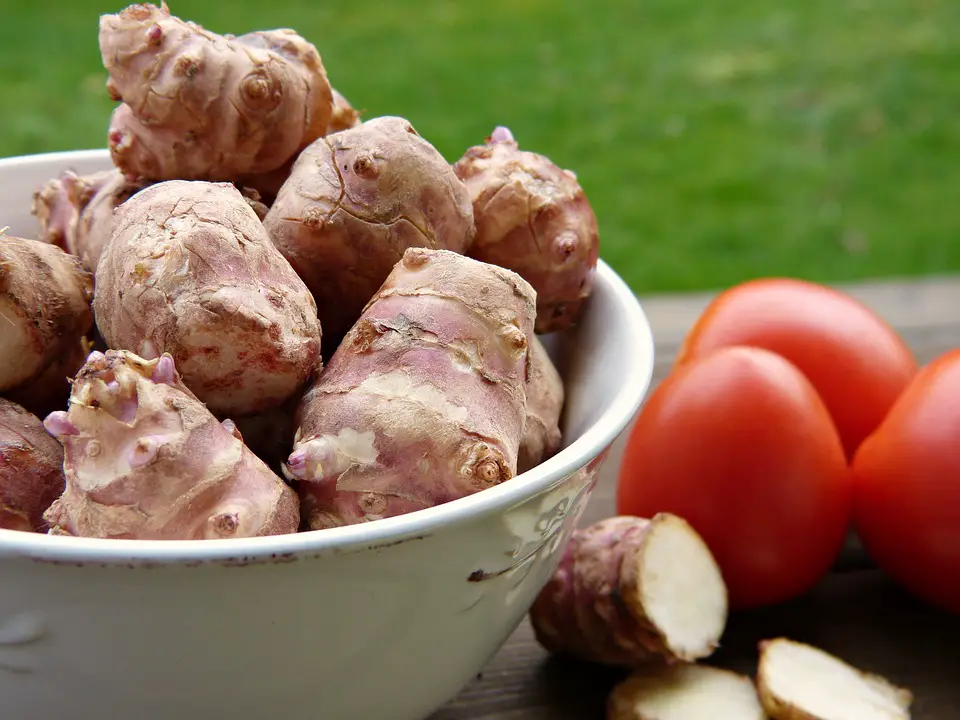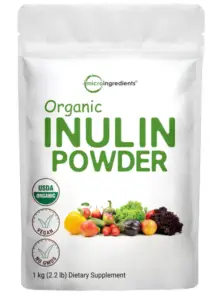
Jerusalem artichoke. Photo via Pixabay.com
With the explosion of the holistic health movement over the past few years, the focus has shifted toward gut health as one of the biggest indicators of a person’s overall health.
Maintaining a healthy gut can be a difficult job, however, considering the sheer amount of bacteria that make up our “living ecoystem:” over 100 trillion cells in total, or about 2 to 6 pounds worth of bacteria in every 200-pound adult.
Doing so requires a concentrated approach, and a mix of the right healthy foods including both prebiotics and probiotics.
While most people know about probiotics, which are used to mitigate the effects of antibiotics and build healthy levels of “good bacteria” in the body, few know the complex role that prebiotics play.
Let’s explore, and discuss the best sources of healthy prebiotics that you may want to consider adding into your diet.
The Health Benefits of Prebiotics for the Gut
Prebiotics are not found in a ton of foods, but the role they play in protecting and nourishing our guts cannot be understated.
That’s because these substances, which are basically a type of dietary fiber that help feed the colon and allow it to work as efficiently as possible, also work in tandem with probiotics to allow the “good” bacteria to flourish.
When you add more fermented foods into your diet such as kimchi, sauerkraut, kombucha, or even its little known Tibetan cousin Jun, they go to work in your gut, producing healthy gut-friendly bacteria. But having enough prebiotic “fuel” in your system will allow you to produce even more of these friendly bacteria, which is especially important considering that achieving balance in the gut is always a concern.
The Top 8 Prebiotic Foods to Add to Your Diet

Like probiotics, prebiotics come from a specialized class of foods that includes everything from fruits to seeds, vegetables, and little-known herbal remedies.
The top 8 prebiotic-containing foods are as follows:
1. Bananas-
Probably the easiest and most convenient food to find in grocery stores and to eat consistently on this list, bananas have been shown to support gut health by reducing bloating and increasing the amount of healthy gut bacteria.
Be sure to by organic whenever possible because conventional varieties may essentially be “cloned.” About 95% of them come from a single variety, Cavendish, and are seedless. These bananas may still be relatively healthy in the short term, but why bother when organic bananas are only a few cents cheaper on average?
2. Chicory Root-
Often used as a replacement for coffee, chicory root is usually brewed like a tea and can be drank as a complement to meals encouraging healthy digestion.
(I like this organic chicory root-based coffee substitute, it tastes like a mix between coffee and hot chocolate and is great for gut health)
What makes chicory root so valuable for gut health is it is comprised of about 47% inulin, the fibrous compound that nourishes gut bacteria, improves digestion and helps relieve symptoms of constipation, according to recent studies and this article from Dr. Arlene Semeco.
3. Asparagus-
These powerful vegetables are not only excellent for building the body because of its relatively high mineral and protein content, but they also contain a high amount of inulin: as much as 2-3 grams per serving.
Pair asparagus with enough healthy probiotic foods and eat it consistently and you have a recipe for incredible gut health.
4. Apples-
Before getting to why apples are so benefical for gut health, it’s important to note that this is one fruit that should always be consumed organic. Apples are banned throughout Europe because of the chemicals we treat them with here in the United States, and are high in pesticides when bought from the “conventional” section in the grocery store.
That being said, you can’t go wrong with apples when it comes to promoting and supporting gut health. Apples contain high amounts of pectin, which bind to toxins and remove them from your body (preventing them from being stored in layers of visceral fat).
The pectin also helps produce butyrate, a short-chain fatty acid that nourishes the good bacteria in your bacteria while also decreasing the bad bacteria, as Dr. Semeco notes.
5. Cruciferous Vegetables-
In addition to asparagus, prebiotic fiber can also be found in cruciferous vegetables including broccoli, cabbage, and cauliflower.
All of these vegetables are also excellent for cancer prevention in addition to their prebiotic benefits.
Alternatives to Vegetables for Prebiotics
If you can’t get enough whole fiber vegetables in your diet, you may want to try organic inulin powder instead.
Inulin powder is a prebiotic supplement that feeds the probiotics in your gut.
It’s more convenient than eating vegetables and can be taken morning and night.
Take one full scoop of this organic powder daily, three times a day.

Organic inulin is a great source of prebiotics. Click here or on the picture to learn more.
This will help to feed the “good” bacteria in your gut so they stay healthy and outnumber the bad guys.
Additional Food Sources of Prebiotics
6. Jerusalem Artichoke-
While the Jerusalem artichoke is not something most people likely to eat every day, that doesn’t mean it should be discarded.
This rarely eaten vegetable happens to be even better at helping to proliferate healthy gut bacteria than chicory root, as 76% of its dietary fiber comes from inulin.
The Jerusalem artichoke can be found in the produce section of select grocery stores or at farmer’s markets, and goes well baked or roasted in the oven tossed in olive oil and spices at about 350 degrees for 35-45 minutes.
You can also find Jerusalem artichoke in the supplement aisle or online, where it comes in a type of inulin powder that helps to improve your body’s absorption of electrolytes like calcium and magnesium, while also helping it to produce more beneficial gut bacteria.
(This organic brand has almost 80 percent 5-star reviews on Amazon)
7. Garlic and Onions-
Similar in properties with high sulphur and natural antibacterial content, onions and garlic (along with their lesser-known cousins, the leek) contain high levels of prebiotics including fructooligosaccharides (FOS), another type of prebiotic found in many of the foods on this list.
8. Cacao (Cocoa)-
In addition to its well known high-magnesium benefits and antioxidants, cacaos flavanol compounds also have the ability to increase healthy gut bacteria, and may lower cholesterol and improve heart health as well according to Dr. Semeco.
When buying cacao, look for brands that are lower in sugar and high in actual cacao content. Many popular chocolate brands get their taste more from sugar than actual cacao, which is the source of this longtime superfood’s biggest health benefits.
Thanks for reading! For more articles like these in your inbox (plus a free eBook), click on this link. Asparagus photo via Susan Voisin/Fat Free Vegan Kitchen.
Thanks for installing the Bottom of every post plugin by Corey Salzano. Contact me if you need custom WordPress plugins or website design.




